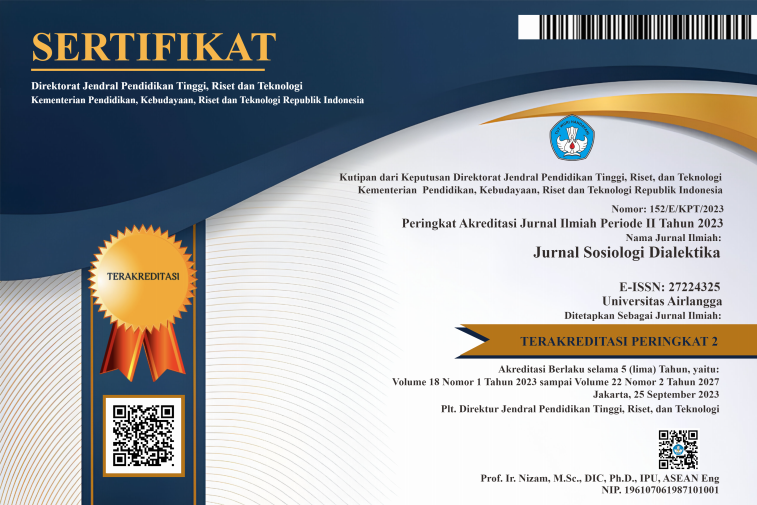The scientific revolution of Thomas S. Kuhn and its contribution to the conflict resolution paradigm in Indonesia
Downloads
The development of science which is reflected by the paradigm shift and the scientific revolution must be able to find new ideas more progressively. This study is motivated by the significance of a paradigm shift in the development of science through discoveries that are useful for the needs of human life. This study aims to explain Thomas Kuhn's epistemological views of the scientific revolutions which have become important issues in his thinking and their implications for society's perspective on conflict paradigms. This article uses a qualitative method to describe Thomas Kuhn's scientific revolution affects social change in society. This study is classified as library research with the individual life history approach. This article shows that Kuhn's thought has been implicated significantly in all scientific disciplines, including the conflict resolution paradigm. Kuhn's thoughts can change the community's perspective or paradigm of conflict resolution models from a security and law approach to local wisdom. In addition, Kuhn's thoughts have changed the meaning of peace, namely from negative peace to positive peace in people's lives. This study concluded that one of the important contributions of Kuhn's thinking of the paradigm shift and scientific revolution is the development of conflict resolution and religious peacebuilding in society.
Anang AA (2019) Sejarah perkembangan ilmu pengetahuan dalam Islam. Fajar Historia 3 (2):98-108.
Bagus L (2000) Kamus Filsafat. Jakarta: PT. Gramedia Pustaka Utama.
Berten K (2001) Sejarah Filsafat Yunani: Dari Thales ke Aristoteles. Yogyakarta: Kanisius.
Bird A (2000) Thomas Kuhn: Philosophy Now. Princeton and London: Princeton University Press.
Bornmann L & Marx W (2014) The wisdom of citing scientist. Journal of the Association for Information Science and Technology 65 (6):1-14.
Capra F (1996) The Web of Life: A New Scientific Understanding of Living Systems. New York: Anchor Books.
Coser L (1956) Functions of Social Conflict. New York: Free Press.
Covey SR (1993) The 7 Habits of Highly Effective People. USA: Simon & Schuster Inc.
Digarizki I & Anang AA (2020) Epistemologi Thomas S. Kuhn: Kajian teori pergeseran paradigma dan revolusi ilmiah. Jurnal Humanitas 7 (1):23-34.
Galtung J (1969) Violence, peace, and peace research. Journal of Peace Research 6 (3):167-191.
Kalman A (2016) "The meaning and importance of Thomas Kuhn's concept of ‘paradigm shift': How does it apply in education?” Opus et Education 3 (2):96-107.
Kamal MAM (2016) The scientific revolution of Thomas Kuhn and their relevances for humanization of Islamic Law. Syariati 2 (2):213-226.
Keraf AS (2014) Filsafat Lingkungan Hidup: Alam sebagai Sebuah Sistem Kehidupan. Yogyakarta: Kanisius.
Kuhn TS (1957) The Copernican Revolution. Cambridge Mass: Harvard University Press.
Kuhn TS (1970) The Structure Scientific of Revolution. Chicago: The University of Chicago Press.
Kuntowijoyo (1991) Paradigma. Bandung: Mizan.
Kuntowijoyo (2004) Metodologi Sejarah. Yogyakarta: Tiara Wacana.
Marcum JA (2005) Thomas Kuhn's Revolution: An Historical. New York: Coontinum.
Muhadjir N (2006) Filsafat Ilmu, Kualitatif dan Kuantitatif untuk Pengembangan Ilmu dan Pengetahuan. Yogyakarta: Rake Sarasin.
Muslih M (2004) Filsafat Ilmu: Kajian atas Asumsi Dasar Paradigma dan Kerangka Teori Ilmu Pengetahuan. Yogyakarta: Belukar.
Orman TF (2016) "Paradigm” as a central concept in Thomas Kuhn's thought. International Journal of Humanities and Social Science 6 (10):47-52.
Politi V (2018) Scientific revolutions, specialization and the discovery of the structure of DNA: Toward a new picture of the development of the sciences. Synthese 195:2267-2293.
Piiparinen T (2015) Beyond the technological turn: Reconsidering the significance of the intervention bridge and peacekeeping drones for UN conflict management. Global Governance 21 (1):141-160.
Putri FA & Iskandar W (2020) Paradigma Thomas Kuhn: Revolusi ilmu pengetahuan dan pendidikan. Nizhamiyah 10 (2):94-106.
Ramsbotham O, Miall H, & Woodhouse T (2011) Contemporary Conflict Resolution. Cambridge: Polity Press.
Sabila NA (2019) Paradigma dan revolusi ilmiah Thomas S. Kuhn (aspek sosiologis, antropologis, dan historis dari ilmu pengetahuan). Zawiyah 5 (1):80-97.
Sandole DJD (2007) Virulent ethnocentrism: A major challenge for transformational conflict resolution and peacebuilding in the post"cold war era 1. The Global Review of Ethnopolitics 1 (4):4-27.
Shadily JM & Echols JM (1975) Kamus Inggris-Indonesia. Jakarta: Gramedia Pustaka Utama.
Shields PM (2017) Limits of negative peace, faces of positive peace. Parameters 47 (3):5-39.
Suriasumantri JS (2010) Filsafat Ilmu: Sebuah Pengantar Populer. Jakarta: Pustaka Sinar Harapan.
Tara S & Sutrisno E (2003) Tokoh dan Peristiwa Sepanjang Masa. Jakarta: Landasan Pustaka.
Taufik Z (2020) From negative to positive peace: Strengthening the role of youth in religious peacebuilding in Bukittinggi West Sumatra. Akademika: Jurnal Pemikiran Islam 25 (2):257-276.
Ulya I & Abid N (2015) Pemikiran Thomas Kuhn dan relevansinya terhadap keilmuan Islam. Fikrah: Jurnal Ilmu Aqidah dan Studi Keagamaan 3 (2):249-276.
Wallenstein P & Sollenberg M (1998) Armed conflict and regional conflict complex: 1989-1997. Journal of Peace Research 35 (5):621-634.
Zubaidi (2007) Filsafat Barat dari Logika Baru Rene Descartes Hingga Revolusi Sains ala Thomas Kuhn. Yogyakarta: Ar-Ruzz Media.
Zubair AC (2002) Dimensi Etik dan Asketik Ilmu Pengetahuan Manusia: Kajian Filsafat Ilmu. Yogyakarta: LESFI.

This work is licensed under a Creative Commons Attribution-NonCommercial-ShareAlike 4.0 International License.
1. Copyright of this journal is possession of Editorial Board and Journal Manager, by the knowledge of author, whilst the moral right of the publication belongs to the author.
2. Legal formal aspect of journal publication accessibility refers to Creative Commons Attribution-NonCommercial-ShareAlike (CC BY-NC-SA), implies that publication can be used for non-commercial purposes in its original form (cannot be modified).
3. Every publications (printed/electronic) are open access for educational purposes, research, and library. Other that the aims mentioned above, editorial board is not responsible for copyright violation.















